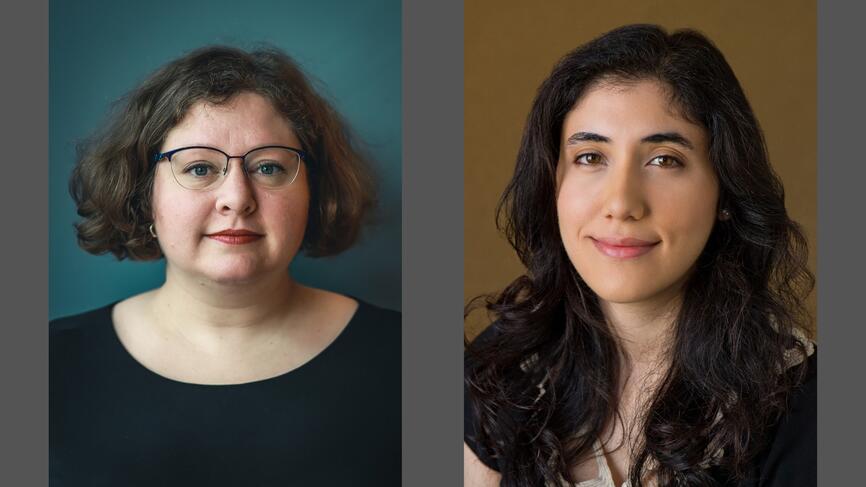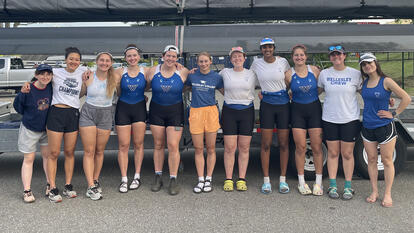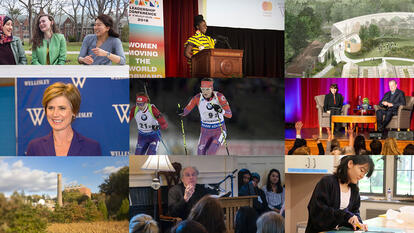
“Liberal arts shows you how to pivot”: STEM Organizations Need Humanities Majors
“If you had told me when I arrived at Wellesley in fall 2003 that despite basically majoring in the literature of the American South, I would be on the forefront of developing programming related to public health crises and biomass-fueled airplanes within 15 years of graduation, I would have laughed you off campus,” says Ashira Beutler-Greene ’07.
Beutler-Greene was an English major and a sociology minor, a member of the Davis Museum Student Advisory Council (DMSAC), a Claflin senator in College Government, and a DJ for WZLY. She earned a middle school teaching certification while at Wellesley and went on to get her Ph.D. in education from University College London. Greene says she definitely did not see herself as “the STEM type” when she was on campus; now, she is a senior manager of content and product strategy at the American Institute of Aeronautics and Astronautics (AIAA).
Life after commencement can be full of unexpected career twists and turns, but perhaps especially so for alums like Beutler-Greene, who were humanities majors at Wellesley and now work for STEM-related organizations. They often find that the skills they acquired studying subjects such as literature, anthropology, or art can apply to any field––and as Beutler-Greene points out, all kinds of organizations need people who can write content for websites, edit monthly newsletters, craft social media strategies, network with donors and experts, and plan events and fundraisers.
Before joining the AIAA in June 2022, Beutler-Greene developed educational media programming for the American Association for the Advancement of Science. She hadn’t worked in the sciences before, but she had experience in curriculum design from her Ph.D. program, and she had planned art programming while part of DMSAC. “I just had to be enthusiastic about the things they were doing, which was not difficult,” she says. “If it’s art, if it’s a robot that will hand you a beer, or a robot that will help you get around if you’re paralyzed, I mean, these things are amazing.”
“Studying liberal arts forces you to take a 10,000-foot view.”
Ashira Beutler-Greene ’07
Beutler-Greene adds that when planning STEM programming, she doesn’t have to explain the science herself, she just has to find qualified people who can: “As a nonexpert, I have the opportunity to take a broader view of the whole program, or industry, and as a liberal arts graduate, I can articulate the main points or values, understand the human need for connection, and how everything is an opportunity to teach or learn.”
Kavindya Thennakoon ’19, an anthropology major and cinema and media studies (CAMS) minor, takes a similar approach in her work at Tilli, a play-based learning and parenting tool she co-created. “I don’t know anything about programming!” Thennakoon says, laughing. “So how do I find people who are really good at what they do and bring them together to problem solve?”
Thennakoon was an economics major for two years, before realizing she wasn’t enjoying the subject. When a stomach bug prevented her from going to a financial company networking event, she took it as a sign from the universe and switched to anthropology. After that, Thennakoon found herself more present in her studies, asking herself with each anthropology class: “How can I enjoy every day? How do I dig into the questions that interest me?”
Thennakoon says studying anthropology and CAMS shaped the way she thinks about problems. “Learning how to problem solve and crafting your pattern of thinking means you can just go into the world and do whatever the hell you want to do,” she says.
English major Rebecca Levine ’07 has been surprised by the ways studying literature and poetry have influenced her day-to-day work for the Prostate Cancer Foundation (PCF). Levine joined the foundation right after graduating because she was interested in nonprofit work. For more than a decade, she has served in different roles advancing PCF’s biomedical and patient-focused research mission. Most recently, she has been leading a $50 million philanthropic partnership between PCF and the Department of Veterans Affairs.

“There’s something really magical about the opportunity to take two organizations and align a strategic focus and mission, and I definitely feel I get to use my English major a lot in these kinds of contexts,” says Levine. “I think about how in some of my courses, we would talk about the same chapter in a Dickens novel or the same poem, and there would be 30 different interpretations of it. There are lots of ways of looking at things, and partnering with two large organizations is never easy. It takes a lot of listening and learning.”
Levine notes that advancing medical research involves not only tackling problems in science but also getting institutions to align around a project, finding legal resources, working out who takes on what, and calculating risk. To help accomplish those goals, she draws on the critical thinking skills she acquired studying poetry and literature.
She adds that storytelling is a major part of science––it’s a tool that can be used to advance collaboration and advocate for more resources, and her ability to deploy it offers a benefit: If she can’t explain a complex scientific topic in the plainest terms, she says, “it’s going to be harder to explain cancer research and urgent health care priorities to decision-makers and funders.”
It’s also an important skill to have when sharing information with the public. “We have certainly seen how complex it is to communicate mass public health messages––as the pandemic pointed out––around prostate cancer, other kinds of cancers, screening guidelines, and treatment guidelines,” Levine says. “These things change on a rapid basis, and being able to communicate those messages and disseminate information on the latest findings from science can be something that requires storytelling.”
Thennakoon advises students who haven’t yet chosen a major not to get too stressed out about the decision. “Undergrad will not prepare you fully for any job. Every single job you will have, you’ll have to learn on the job,” she says. “The world is so unpredictable and tools change––like coding languages change––and you can always learn those skills later. If you focus on taking the classes you like and honing the way you think, really diving into different problems and finding what problems excite you, I think that's what matters.”
“Consider classes in the humanities!” says Levine. “STEM needs humanities majors. Explore things and do what you love, because you can truly major in anything and do anything.”
Beutler-Greene feels her employers have not been concerned that she doesn’t have a STEM background; they knew she had attended Wellesley and trusted her, saying: “You’re smart, you’ll figure it out.”
“The real question is: How are you adaptable? How are you flexible? How do you take the unexpected and make something out of it? How do you show follow-through? How do you show creativity and optimism?” she says. “Studying liberal arts forces you to take a 10,000-foot view. You’ve had to work with the left side of your brain and the right side of your brain to imagine and understand that you need all these tools to solve problems and make a difference. Liberal arts shows you how to pivot. Liberal arts should mean a lack of fear.”



